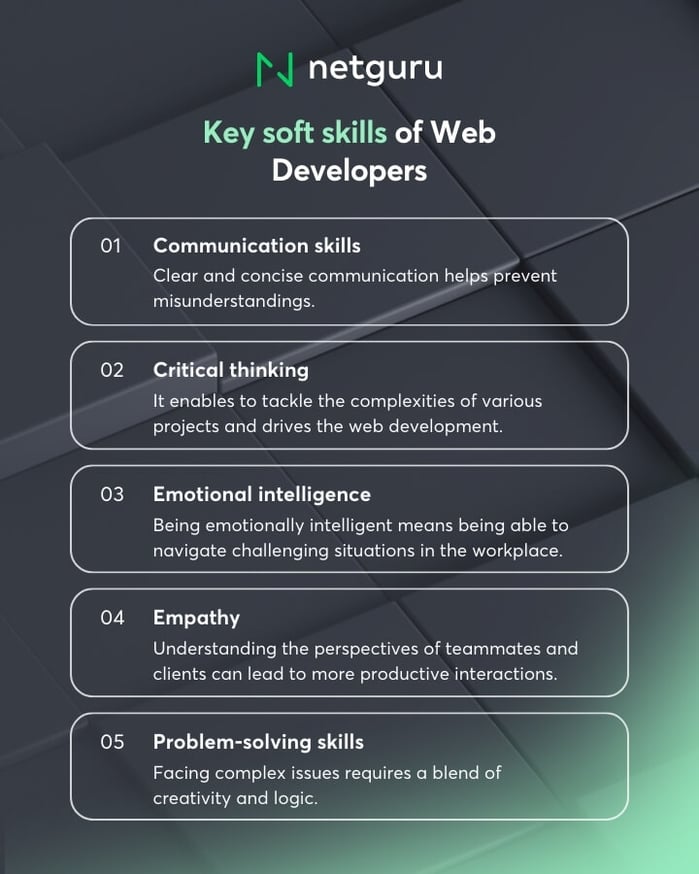Web Developer Soft Skills: The Essential Guide for Career Growth

Skills such as effective communication, problem-solving, and adaptability not only improve job performance but also open doors to new opportunities and career growth. These skills are essential for web developers looking to make a significant impact in their roles.
At the core of these essential soft skills is the ability to work well with others. Whether it’s collaborating with team members on a project or communicating with clients to understand their needs, the importance of interpersonal skills cannot be overstated. The tech industry is known for its fast pace and constant change, making flexibility and continuous learning key attributes of a successful web developer.
Nurturing these soft skills requires a conscious effort and a willingness to step outside the comfort zone of purely technical tasks. Embracing challenges, seeking feedback, and engaging in continuous learning are all critical steps in developing the personal attributes that complement technical expertise. Together, these skills form the foundation of a well-rounded and highly effective web developer.
Understanding the Core Web Developer Soft Skills
At the heart of a successful web development career lies a set of core soft skills that are crucial for both personal growth and professional success. These include communication skills, emotional intelligence, problem-solving abilities, and adaptability. These skills enable developers to work effectively in teams, navigate the complexities of software projects, and continue growing in a rapidly changing industry.

Communication Skills: The Foundation of Effective Teamwork
Communication skills are crucial for web developers as they often work in teams that include project managers, fellow developers, and other tech professionals. Effective communication involves not just talking but also listening, whether it's through instant messaging, written communication, or in-person meetings. Clear and concise communication helps prevent misunderstandings and ensures that everyone is on the same page, making it a foundational skill for successful teamwork.
Enhancing Project Collaboration through Clear Dialogue
Project managers and web developers rely on clear dialogue to navigate the complexities of software design. Effective communication ensures that project goals are understood, timelines are met, and any issues are promptly addressed. By fostering an environment where open and honest communication is encouraged, teams can collaborate more effectively, leading to innovative solutions and successful project outcomes.
Emotional Intelligence: Connecting with Teammates and Clients
Emotional intelligence is the ability to understand and manage one's own emotions, as well as empathize with others. For web developers, being emotionally intelligent means being able to navigate challenging situations in the workplace, from changing client requirements to working closely with fellow developers. Hiring managers often look for emotionally intelligent candidates who can adapt to these situations and connect with teammates and clients on a deeper level.
Empathy and Self-awareness in the Tech Environment
In the tech environment, empathy and self-awareness are key components of emotional intelligence. Understanding the perspectives of teammates and clients, and being aware of one's own emotional responses, can lead to more productive interactions and stronger relationships. These qualities allow developers to better handle the pressures and challenges of the industry, making them invaluable assets to their teams.
Problem-solving Skills: Navigating Challenges Creatively
Problem-solving skills are at the core of what it means to be a web developer. Facing complex issues, from debugging software systems to optimizing for various operating systems, requires a blend of creativity and logic. These essential soft skills for software engineers, including problem-solving and critical thinking skills, enable developers to find innovative solutions to technical challenges, making them indispensable in the tech industry. Developers can improve web development skills through consistent coding practice, mentorship, and continuous learning. Problem-solving skills are particularly crucial in back end web development, where developers must ensure server-side functionality and data management are seamless.
Critical Thinking and Innovative Solutions in Web Development
Web development is a field where critical thinking and innovative solutions are highly valued. Problem-solving is not just about fixing bugs; it's about foreseeing potential issues in software systems and developing proactive solutions. The ability to think critically and solve problems creatively is among the essential soft skills for software engineers, enabling them to tackle the complexities of various projects and drive the development of cutting-edge technologies.
The Personal Attributes of a Successful Web Developer
Success in web development goes beyond technical knowledge and coding skills. It encompasses a set of personal attributes that enable developers to navigate the challenges and opportunities of the tech industry. These attributes include effective time management, adaptability, and a commitment to continuous learning. Together, they form the foundation of a successful web developer's skill set, facilitating both personal growth and professional excellence.
Time Management: Mastering the Art of Productivity
Time management is a critical soft skill for web developers. It involves not just managing one's own time effectively but also responding constructively to feedback and adjusting priorities as needed. Mastering time management allows developers to meet deadlines, manage workloads, and maintain a healthy work-life balance, contributing to both job satisfaction and project success.
Prioritization and Efficient Workflow Techniques
Prioritization and efficient workflow techniques are essential for maximizing productivity in web development. By identifying the most critical tasks and organizing work efficiently, developers can ensure that they are focusing their efforts where they matter most. Implementing strategies such as breaking tasks into smaller, manageable parts and using time effectively can significantly improve project outcomes and personal efficiency.
Adaptability and Flexibility: Staying Agile in a Fast-Paced Industry
Adaptability refers to a web developer’s ability to adjust to new challenges, technologies, and project requirements. In a fast-paced industry like tech, adaptability skills are crucial for staying relevant and competitive. Developers who can quickly learn new programming languages, embrace changing project needs, and adapt to new working environments are more likely to thrive and advance in their careers. Adaptability is especially important for back end developers, who must stay updated with the latest server-side technologies and frameworks. This is especially important in back end web development, where proficiency in back-end programming languages like Java, Python, and PHP is essential for creating dynamic, user-friendly web applications.
Embracing Change and Learning New Technologies
Embracing change and continuously learning new technologies are key aspects of staying agile in web development. As the tech world evolves, developers must be proactive in updating their skills and embracing new tools and methodologies. Learning various web development frameworks such as Django, Ruby on Rails, and Express.js is essential, as these frameworks streamline the development process and enhance productivity and efficiency in building scalable web applications. This commitment to continuous improvement not only enhances a developer’s skill set but also ensures that they can contribute to innovative projects and stay at the forefront of industry trends.
Self-Learning: Fueling Continuous Growth and Improvement
Self-learning is a powerful engine for continuous growth and improvement in the tech world. With a wealth of resources available, from online courses to tech forums, developers have endless opportunities to enhance their engineering soft skills and technical knowledge. Soft skills for a software professional, such as the ability to learn independently, are invaluable for adapting to new technologies and advancing one's career.
Resources and Strategies for Independent Skill Enhancement
Developing a strategy for independent skill enhancement involves leveraging a variety of resources, such as online courses, industry blogs, and tech meetups. By setting clear learning goals and dedicating time to self-study, web developers can continuously expand their skill set. Utilizing version control systems like GitHub for managing code changes is also crucial, as it enhances development skills by facilitating features such as branching, merging, and rollback. This proactive approach to learning not only enriches their professional development but also positions them for success in the ever-evolving landscape of web development.
Interpersonal Skills and Team Collaboration
Interpersonal skills are the cornerstone of effective team collaboration in web development. These soft skills for developers are what enable them to work harmoniously with others, whether in brainstorming sessions or when addressing project challenges. Software engineer soft skills, including communication and empathy, play a significant role in fostering a conducive work environment that encourages innovation and productivity.
Accountability: Owning Your Work and Learning from Mistakes
Accountability is about taking ownership of one's actions and decisions in the workspace. It involves acknowledging when mistakes are made and learning from them to prevent future recurrences. This practice not only enhances personal growth but also builds a culture of trust and responsibility within the team.
Building Trust and Reliability within Your Team
To build trust and reliability within a team, one effective method is practice writing clear and concise documentation for projects. This habit ensures that everyone is on the same page and can depend on each other's work. Reliable documentation is a tangible proof of commitment and competence, which, in turn, strengthens team bonds.
Collaboration and Teamwork: Achieving Collective Goals
Effective collaboration and teamwork hinge on strong communication skills. Understanding each other’s strengths and weaknesses, coupled with active listening, can significantly enhance team dynamics. This is especially true in app development projects, where diverse skill sets need to converge towards a common goal. Effective collaboration and teamwork are crucial for developing robust web applications, as they require the integration of various programming languages and frameworks to meet modern user needs.
Nurturing a Positive and Inclusive Team Culture
Fostering a positive and inclusive team culture is crucial in web development. Encouraging open communication and respecting diverse viewpoints contribute to a healthy work environment. Such a culture not only boosts morale but also inspires creativity and innovation, leading to more successful projects.
Patience: The Virtue of Dealing with Development Processes
Patience plays a critical role in the software development process. It’s essential for web developers to understand that great results take time and perseverance. Being patient helps in efficiently tackling project delays and technological hurdles, ensuring that the final product meets or exceeds expectations. Additionally, patience is crucial in maintaining websites, as ongoing tasks such as updates, testing, and enhancing user experience are essential to keep a website attractive and performing well after its initial creation.
Managing Frustrations and Maintaining Focus on Long-Term Goals
Dealing with frustrations is part of the development journey. It's important to keep a clear focus on long-term goals and not let temporary setbacks derail progress. Strategies such as setting smaller, achievable milestones can help maintain motivation and ensure that the team is aligned towards the ultimate objectives.
The Professional Development of Web Developers
The professional development of web developers is an ongoing journey that requires a balance between technical skills and soft skills. Software development requires not only proficiency in coding but also skills to succeed in the technology industry, such as problem-solving, critical thinking, and adaptability.
Leadership: Inspiring and Guiding Teams to Success
In the realm of web development, leadership is about more than just technical skills. It involves inspiring and guiding teams to success, fostering an environment where creativity and innovation can thrive. Effective leaders in the technology industry understand the importance of nurturing both the technical and soft skills to succeed.
Developing Leadership Qualities as a Web Developer
Developing leadership qualities as a web developer involves a commitment to continuous learning and personal growth. It's about taking initiative, mentoring others, and being open to feedback. A leader in web development not only excels in technical areas but also demonstrates strong interpersonal skills, setting a positive example for the team.
Negotiation: Communicating Value and Reaching Consensus
Negotiation is an integral part of software development, involving effective communication to convey value and reach consensus. It requires the ability to interact with clients, understand their needs, and propose solutions that meet those needs. A developer's communication style can significantly impact the success of these negotiations.
Effective Strategies for Negotiating Project Terms
Effective strategies for negotiating project terms include clear communication, understanding the client's perspective, and being flexible in finding mutually beneficial solutions. It's about finding a balance between meeting project requirements and ensuring the development team can deliver quality work within realistic timelines.
Attention to Detail: Ensuring Quality and Precision in Work
Attention to detail is essential for ensuring quality and precision in web development work. It's the meticulousness in coding, testing, and debugging that leads to robust and reliable software products. A developer's commitment to detail can significantly impact the success and longevity of a project.
The Impact of Meticulousness on Project Outcomes
The impact of meticulousness on project outcomes cannot be overstated. Development teams that prioritize precision and thoroughness in their work tend to produce higher-quality software that stands the test of time. This attention to detail not only enhances the user experience but also contributes to the project's overall success.
Highlighting Your Web Developer Soft Skills
Highlighting your web developer soft skills is crucial in demonstrating your full potential to employers. These skills, including effective communication, problem-solving, and adaptability, complement your technical abilities and show that you are a well-rounded candidate. Presenting these skills effectively on your resume, cover letter, and during interviews can significantly impact your career opportunities.
Soft Skills for Your Resume: Making a Strong First Impression
In the competitive landscape of web development, your resume serves as the initial handshake with hiring managers. To stand out, the skills section should not only list your technical prowess but also highlight your abilities in communication, teamwork, and problem-solving. Including search engine optimization skills on your resume can demonstrate your ability to improve website visibility and ranking, making you a more compelling candidate. These soft skills demonstrate your capacity to thrive in collaborative environments and adapt to the evolving needs of projects, making you a more compelling candidate.
Cover Letter Strategies: Showcasing Your Soft Skills to Employers
Your cover letter is a prime opportunity to narrate the story behind your resume. Here, you can illustrate how your soft skills have enabled you to grow professionally and contribute to previous teams and projects. By weaving in examples of challenges overcome through effective communication or creative problem-solving, you provide a glimpse into the kind of value you would bring to the employer's table.
Acing the Job Interview: Demonstrating Your Web Developer Soft Skills in Action
Job interviews in the tech industry often delve into how you've applied your technical skills to solve problems. However, equally important is demonstrating your soft skills. Discuss scenarios where your ability to work collaboratively, adapt to change, or lead a project to success played a critical role. This not only shows your technical competence but also your readiness to be a part of a dynamic team.
A Roadmap to Excellence: Nurturing Your Web Developer Soft Skills
Developing your soft skills is a journey that enhances your professional toolkit, making you indispensable in the tech industry. By recognizing the value of emotional intelligence, adopting efficient management skills, and fostering an environment where creative solutions to problems are encouraged, you set the stage for continuous professional development. This commitment to growth ensures that you remain agile and responsive in a fast-paced industry.
Tips for Practicing Soft Skills in the Workplace
Practicing soft skills in the workplace involves a conscious effort to be more emotionally intelligent in interactions, applying problem-solving skills to everyday challenges, and managing tasks and people with finesse. Encourage open communication and actively seek to understand the perspectives of colleagues. This approach not only fosters a positive working environment but also propels your professional development forward by leveraging emotionally intelligent responses and creative solutions.
How Web Developers Can Continuously Improve Their Soft Skills
For web developers, honing soft skills is as crucial as mastering coding languages. Continuous improvement involves seeking feedback, engaging in active listening, and being open to learning from every interaction. Understanding the web development process and continuously improving both technical and soft skills is essential. By prioritizing soft skills for a software development career, developers ensure they remain versatile, collaborative, and innovative, ready to meet the challenges of an ever-evolving technological landscape.
Seeking Feedback: The Key to Personal and Professional Growth
Feedback is the cornerstone of improvement for web developers. It provides insights into areas of strength and opportunities for growth, both technically and in terms of soft skills. Embracing constructive criticism and using it as a tool to refine your approach to problem-solving, teamwork, and project management is essential for personal and professional advancement.
The Future of Web Development: Beyond Technical Expertise
The future of web development transcends mere technical abilities. As the industry evolves, the importance of soft skills such as collaboration, adaptability, and effective communication becomes paramount. Techniques like pair programming underscore the shift towards a more integrated and interpersonal approach to creating technology solutions, highlighting the need for developers to balance their technical expertise with strong interpersonal skills.
The Evolving Role of Soft Skills in the Tech Industry
The tech industry increasingly recognizes the value of soft skills alongside technical knowledge. In an environment that thrives on innovation and collaboration, the ability to communicate effectively, resolve conflicts, and lead with empathy is becoming as essential as coding skills. Additionally, ensuring compatibility and functionality across various web browsers is crucial to enhance the user experience. This shift underscores the importance of a well-rounded skillset in driving success within the tech landscape.
Preparing for the Future: Embracing Soft Skills Development
As the tech industry continues to evolve, preparing for the future means embracing soft skills development with the same vigor as technical training. Web developers should seek opportunities to improve their communication, leadership, and emotional intelligence. By prioritizing these areas, developers can ensure they remain adaptable and effective in a dynamic industry, ready to tackle the challenges of tomorrow with a comprehensive skillset.
Unlocking Your Full Potential: The Power of Web Developer Soft Skills
The journey of a web developer extends beyond just writing code and delving into the technical aspects of software engineering. In fact, soft skills for software developers are becoming increasingly critical in today's dynamic digital landscape. These vital soft skills, including communication and collaboration, directly or indirectly influence how developers build software applications, navigate coding challenges, and meet project requirements. Emphasizing the importance of soft skills, these abilities are highly valued by employers, as they significantly contribute to the successful execution of project management methodologies like agile methodology, and enhance the development environments in which teams operate.
Moreover, the role of a software developer is evolving, influenced by advancements in computer science fields such as artificial intelligence, requiring not only proper training in secure software but also in soft skills training. Hiring a developer who is highly sought after in the industry means looking for someone who is not only interested in applying their technical knowledge but also possesses the software developer soft skills needed to resolve conflicts, adapt to changes, and work effectively within a team. This blend of skills ensures that a developer can lead projects towards innovation and efficiency, making them indispensable in the creation of impactful software applications.






